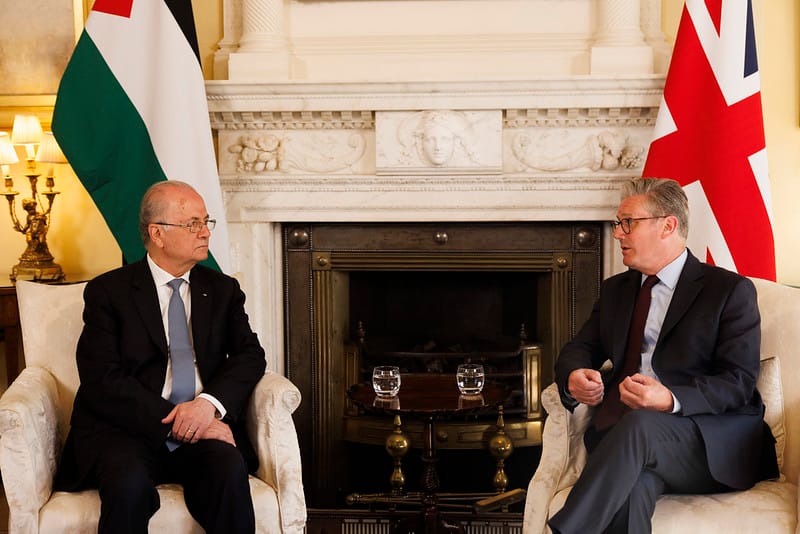A faustian pact between Chabad and Orbán
How Hungarian Ultra-Orthodoxy found an ally in Europe’s most notorious antisemite.

In December, news emerged that EMIH – a Chabad affiliate based in Hungary – received almost 2 billion Hungarian Forint (£5,128,000) for a new “cultural complex”. Milton House, named after both the English poet John Milton and the EMIH-owned Milton Friedman University – will accommodate a 200-capacity auditorium, smaller performance halls and an art gallery spread over 43,000ft² in Józsefváros, Budapest. The benefactor? Viktor Orbán.
To outside observers, such generosity might seem uncharacteristic of the Hungarian prime minister, a man notorious for his relentless campaign against George Soros, rehabilitation of the Nazi-collaborating Horthy government and resulting alienation of Hungarian Jews, only 1 per cent of whom voted for his party in 2017. How did a Jewish organisation like EMIH end up bankrolled by one of Europe’s most antisemitic governments?
Understanding this unholy alliance requires a short history lesson. Before the Holocaust, there were three main Jewish denominations in Hungary: the Orthodox, who resisted assimilation; the Status Quo Ante, which like Modern Orthodoxy synthesised strict religious observance with selective secular participation; and the Neologs, a denomination similar to Masorti and similiarly dominated by the urban, assimilated, middle class. The small Status Quo Ante sect were all but wiped out by the Nazis; only the Neologs and a small Orthodox community remained. As a result, Hungarian Jewry took on the aspect of the Neologs, becoming overwhelmingly urban, middle-class and assimilationist. Then the Iron Curtain fell. The end of communism and its concomitant religious repression precipitated a Jewish renaissance in Hungary: synagogues revived, schools reopened, summer camps restarted. Hungarian Jews reaffirmed the religious identity they had been forced to hide for so long.
Chabad spotted an opportunity. Hungary’s new landscape of religious freedom offered fertile terrain for the movement’s unique brand of intra-communal evangelism and in 1989, the Lubavitcher Rebbe dispatched Baruch Oberlander, a young American rabbi with roots in Hungary, to Budapest. Oberlander received a warm welcome – not least because Hungary’s main Jewish body at the time, Mazsihisz, was widely viewed as corrupt; its former CEO Gusztáv Zoltai was forced to resign in 2014 after a review into the organisation’s finances, and went on to advise Orbán’s second-in-command.
In the years since, Chabad has been attempting to dethrone Mazsihisz as Hungarian Jewry’s main representative body. In 2004, Chabad set up the Unified Hungarian Jewish Congregation (EMIH) as a registered religious organisation or “church”. In 2012, the government raised the official status of EMIH to that of an “established church”. In 2019, Deputy Prime Minister Zsolt Semjén went even further, announcing that EMIH would receive “the highest form of recognised church status”, beyond even that of an “established church”. The move enabled the Hungarian state to offer greater support to EMIH, including sponsoring places at its Milton Friedman University, and offering funding for capital projects. It also announced EMIH as the government’s main Jewish partner. Mazsihisz was not best pleased.
As EMIH’s ties to the government have tightened, its rival’s have slackened. In 2014, Mazsihisz broke off contact with Orbán regime after a sculpture depicting an eagle attacking an angel, intended to commemorate the Hungarian victims of Nazi occupation, was unveiled on Budapest’s Freedom Square. Four years later, Mazsihisz dropped out of the planning of a new Holocaust museum on the grounds that the project, spearheaded by the controversial pro-Orbán historian Mária Schmidt, sought to downplay Hungary’s role in the Holocaust. EMIH happily took their place. EMIH has strained to excuse Orbán’s antisemitism: when asked in a 2017 interview about the prime minister’s demonisation of George Soros, EMIH chief executive Rabbi Slomó Köves argued that most people saw Soros not as a Jew, but as a representative of global capitalism.
Köves has defended Chabad’s willingness to work with Orbán as the surest means of “further[ing] the cause of Jewish religious life and education”. He may not primarily mean Jewish life in Hungary. For Köves has also justified Chabad’s friendship with Orbán on the grounds that the latter’s support for Israel allows “authentic Jews” to thrive (of course, Chabad’s aim is that they should thrive in Israel). “The positive coverage Israel gets in the right-wing Hungarian media was unimaginable 10 years ago,” he has said. “[T]he way Israel – the Jewish state – is perceived cannot be separated from public attitudes towards Jews in general.” This tendency not simply to overlook the antisemitism of Israel’s supporters, but to view support for Israel as a form of philosemitism, is not unique to Hungary.
Meanwhile, cozying up to EMIH consolidates Orbán grip on power – specifically, on his critics. It is immensely convenient for Orbán that EMIH owns a small media conglomerate owned by EMIH, which includes Hungary’s last pro-opposition radio network, Klubrádió, 168 Óra, a weekly newspaper, and Neokohn, a pro-government Jewish foreign policy newspaper. In January, 168 Óra removed an (accurate) report about the forced sterilisation of a female hospital worker (assumed to be Roma) and fired the editor who published it.
Needless to say, this partnership also whitewashes Orbán’s antisemitism. By narrowly defining “authentic” Judaism as strict religious observance and unquestioning support for Israel (Mazsihisz’s Rabbi Gábor Fináli receives semi-regular attacks from EMIH and his criticisms of Israel), Chabad has enabled Orbán to present himself as the guarantor of Jewish interests.
This mutually beneficial alliance between the Jewish religious right and the non-Jewish political right reflects a global realignment, one facilitated by a redefinition of antisemitism that appears to glom more on to the left than the right. This shift has been most dramatic in the United States, where among the most influential advisors to and supporters of a president many believe to be a white supremacist – Stephen Miller, Jared Kushner, AIPAC – are Jewish.
In Hungary as elsewhere, this realignment is unlikely to ensure Jewish security in the long term. For while EMIH and Orbán may temporarily find common ground, ethnonationalism is founded on a logic of exclusion which, sooner or later, will find its way to Jews. The situation in Hungary has not yet turn violent, but the sight of antisemitic posters in the streets of Budapest suggests an escalation would be easy. In refusing to speak up against Orbán, EMIH is playing a dangerous game. ▼
Iván Merker is a master’s student in political theory, and a regular contributor to the Hungarian newspaper Mérce.
Author
Iván Merker is a master’s student in political theory, and a regular contributor to the Hungarian newspaper Mérce.
Sign up for The Pickle and New, From Vashti.
Stay up to date with Vashti.



